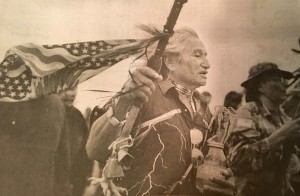Phil Little Thunder Sr. joined the protest of the Standing Rock Sioux Tribe in North Dakota – an iconic figure marching with thousands from other tribal nations – in order to stop a noxious crude oil pipeline from tunneling under Lake Oahe, a tribe’s crucial water source, fearing the pipe will leak its oleaginous poisons into these life-giving waters, and because the line, if not adjusted, will destroy the tribe’s burial grounds, and historic and ancestral cultural sites.
The proposed Dakota Access pipeline, if allowed to proceed, under the auspices of “Energy Transfer Partners,” would travel 1,170 miles, crossing the Sioux land, en route to the Gulf coast.
You may think this has nothing to do with the Commonwealth of Virginia. But there are lessons to learn so we may resist the risky fossil fuel industry energy choices close to home including Dominion’s effort to lay 550 miles of fracked gas pipelines within feet of the homes of many Virginia landowners, at the risk of these volatile gases exploding, as did occur in Appomattox, Virginia.
We can’t count on the General Assembly, not the Democratic nor Republican parties, as Dominion has showered its financial largesse on key members of both parties.
The success or failure in fighting this Dakota pipeline and the key lessons learned from the defeat of the XL pipeline instruct us how to represent ourselves when those elected fail to represent us.
Last Friday, U.S. District Judge James E. Boasberg denied the tribe’s demands to stop the pipeline, saying that the tribe had failed to show “it will suffer injury.” In what alternate universe is the risk that a critical water source may be destroyed not a cognizable “injury?” Continue reading

